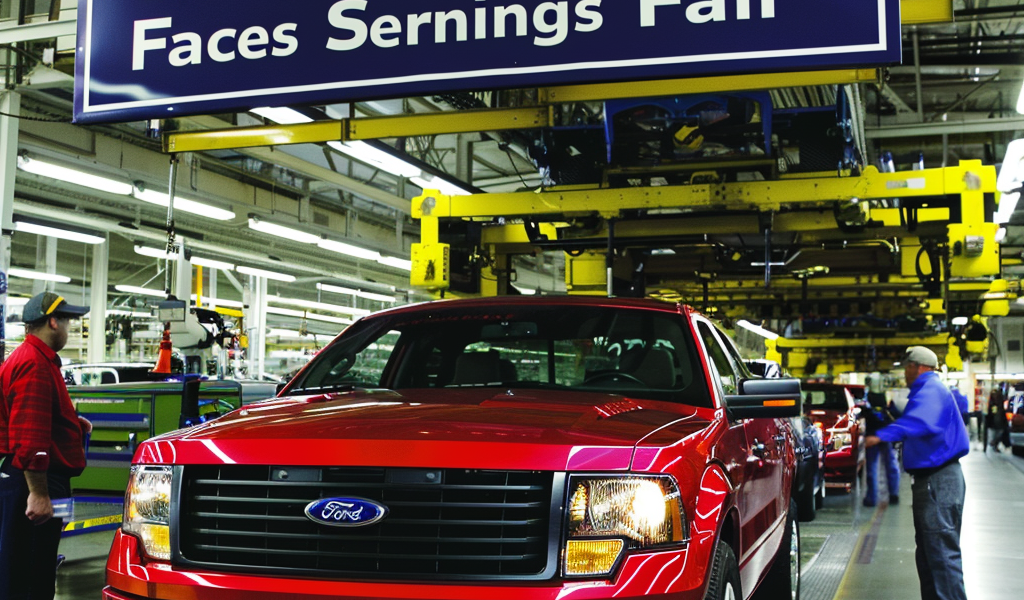Ford Motor Company Faces Setback as Earnings Fall Short of Expectations
Ford Motor Company has recently reported its second-quarter earnings, revealing a significant shortfall compared to Wall Street’s expectations. The automaker’s earnings report shows that while it managed to exceed revenue estimates, it struggled with profitability, attributed mainly to ongoing warranty costs that have been a persistent issue for the company.
In a recent statement, Ford announced that its adjusted earnings per share stood at 47 cents, falling short of the anticipated 68 cents. However, the company did report automotive revenue of $44.81 billion, which slightly surpassed the expected $44.02 billion. This mixed performance led to a notable decline in Ford’s stock, which plummeted by approximately 11% after the market closed, ending at $13.67 per share.
Warranty Costs Impacting Profitability
Ford’s Chief Financial Officer, John Lawler, highlighted that the company’s profitability has been significantly affected by increased warranty reserves. These reserves are used to address issues related to vehicles from the 2021 model year and older. Lawler noted during a media briefing that the warranty costs for the second quarter were $800 million higher than in the previous quarter, although he refrained from disclosing the total warranty cost.
Despite these challenges, Ford is optimistic about its future. The company has initiated several strategies aimed at improving the quality of its vehicles and optimizing vehicle launches, which are expected to mitigate warranty costs moving forward. Lawler expressed confidence in the company’s progress, stating, “We’re making real progress in raising quality, lowering costs and reducing complexity across our entire enterprise.” He emphasized that these improvements would ultimately benefit the company in the long term.
Revised Financial Outlook
In light of its financial performance, Ford has adjusted its full-year target for free cash flow upwards but has maintained its earnings guidance for 2024. The company is projecting adjusted earnings before interest and taxes (EBIT) to fall between $10 billion and $12 billion, a figure that disappointed some investors who were hoping for a more optimistic outlook.
For the second quarter, Ford’s net income was reported at $1.83 billion, or 46 cents per share, down from $1.92 billion, or 47 cents per share, in the same period last year. Additionally, the adjusted EBIT saw a significant decline of 27% year-over-year, dropping from $3.79 billion, or 72 cents per share, to $2.76 billion, or 47 cents per share.
Ford’s Strategic Initiatives
Despite the earnings miss, Ford’s CEO, Jim Farley, has reiterated the company’s commitment to its Ford+ restructuring plan, which aims to enhance profitability and streamline operations. The plan encompasses various initiatives, including investing in electric vehicle technology and expanding the company’s product lineup.
Ford’s leadership believes that these strategic initiatives will not only help the automaker navigate current challenges but also position it favorably in a rapidly evolving automotive landscape. As the industry shifts towards electric vehicles and sustainable practices, Ford is keen on staying competitive while addressing its internal challenges.
Market Reaction and Future Outlook
The market’s reaction to Ford’s earnings report underscores the cautious sentiment among investors. The substantial drop in stock price reflects concerns over the company’s ability to manage warranty costs effectively and deliver stronger earnings in the upcoming quarters. Analysts will be closely monitoring Ford’s performance as it implements its restructuring plan and seeks to improve its financial standing.
As Ford moves forward, the company remains focused on enhancing its operational efficiency and quality control measures, which are critical for restoring investor confidence and achieving long-term growth. With the automotive sector facing various challenges, including supply chain disruptions and shifting consumer preferences, Ford’s ability to adapt and innovate will be crucial in the coming years.





